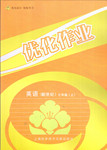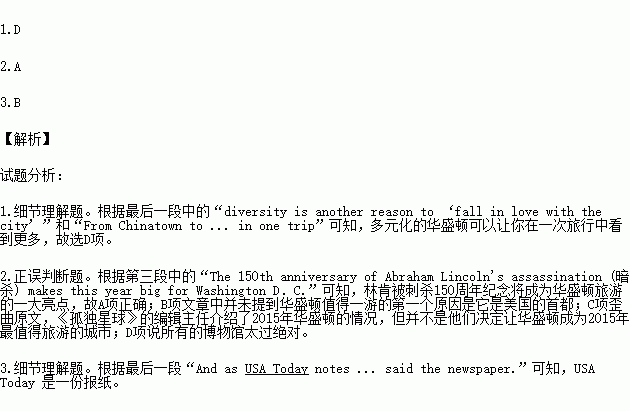题目内容
阅读理解。
Washington D.C. is No.1
It is best known as a city of monument. In the middle of traffic circles or on street corners, you'll find statues, plaques (匾牌), and simple blocks of marble there. They honor the people who helped shape the US.
And on Oct. 20, Lonely Planet, one of the world's largest travel guides, named Washington D.C. the No.1 city in its list of “Best in Travel 2015”.
“The year 2015 is a fantastic year to visit Washington D.C.,” Tom Hall, editorial director of Lonely Planet, told The Guardian. “The 150th anniversary of Abraham Lincoln's assassination (暗杀) makes this year big for Washington D.C. The famous top hat of America's 16th president and the gun that fired the deadly shot will be on display. Add that to its incredible eats, performing arts and museums. The nation's capital is looking better than ever.”
There are a lot of free museums in the city. When British scientist James Smithson died in 1829, he left a will giving his money to the United States to open a museum at Washington, under the name of the Smithsonian Institution. It has turned out to be a wonderful gift, and the institution now covers 19 museums. And of course, no Washington tour is complete without seeing the White House, the Capitol, and the Supreme Court, which are home to the three pillars (核心) of the
US government. But there is more to explore in the center of the US power. It is a city you can walk across, with wide?open avenues, old neighborhoods, and river views.
And as USA_Today notes, diversity is another reason to “fall in love with the city”. “There is a lot of diversity in Washington D.C., seen in its people, its neighborhoods and its landmarks. From Chinatown to Little Ethiopia, visiting the nation's capital is like seeing the world in one trip,” said the newspaper.
1.One of the reasons why Washington D.C. is worth a visit in 2015 is that ________.
A.food and performing arts there are much better than anywhere else in the world
B.the top hat of 15th president of America will be on show in the year 2015
C.seeing the museums will make your tour in Washington D.C. complete
D.the diversity of the city offers you an opportunity to see more in one trip
2.Which of the following details is RIGHT according to the article?
A.The 150th anniversary of Lincoln's assassination makes the tour more worthwhile.
B.The first reason why Washington D.C. is worth a visit is that it is the capital of the country.
C.Lonely Planet decides to make Washington D.C. a most?visited place in 2015.
D.All the museums in Washington D.C. were named after the Smithsonian Institution.
3.What is USA Today according to the last paragraph?
A.A well?known company.
B.A newspaper.
C.An advanced institution.
D.A website.
 培优三好生系列答案
培优三好生系列答案 优化作业上海科技文献出版社系列答案
优化作业上海科技文献出版社系列答案

 and cast my line
and cast my line